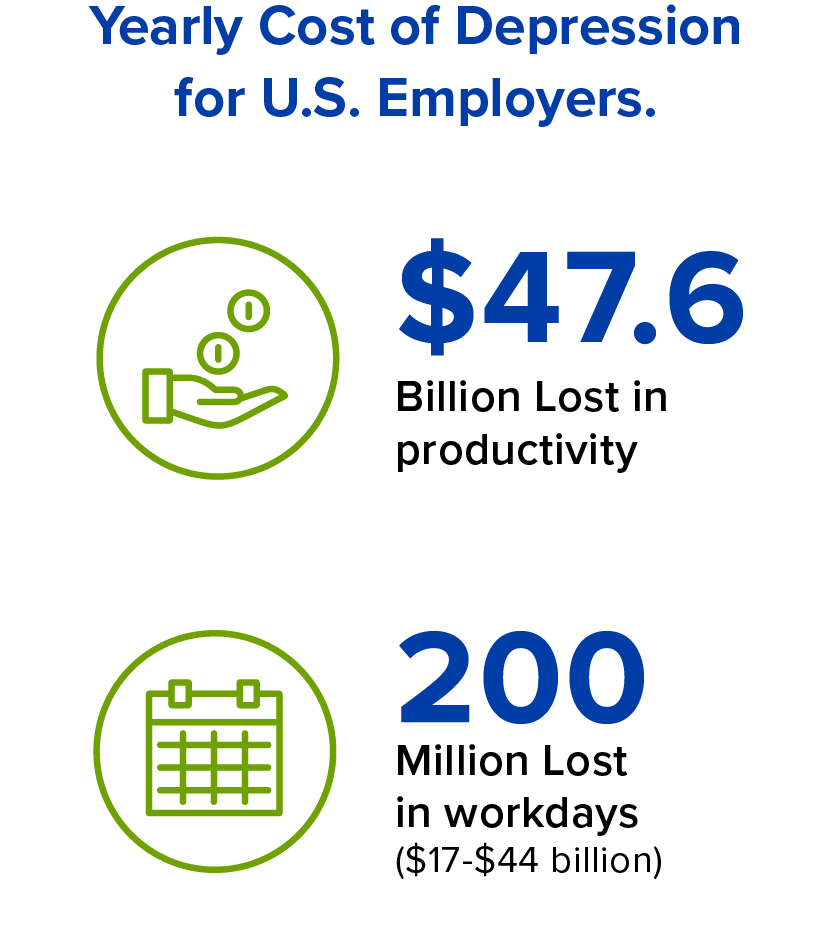
Mental Health Issues Contribute to Employer Spend by Over $200 Billion Annually
The World Health Organization describes mental health as a state of mental well-being that enables people to cope with the stresses of life, realize their abilities, learn well and work well, and contribute to their community.[1] Just as we are all encouraged to monitor and manage our physical health needs, it is just as vital to protect and promote mental well-being. Additionally, it is imperative to address the needs of people with mental health conditions along with those who support these patients who may be directly or indirectly impacted such as medical caregivers and employers.
Mental and Physical Impacts
More than one in five U.S. adults live with anxiety, depression, seasonal affective disorder, bipolar disorder, major depression, schizophrenia, post-traumatic stress disorder (PTSD), and more.[2] While these are mental health conditions, they can come with physical symptoms such as headaches, fatigue and digestive problems and can cause insomnia, restlessness and difficulty concentrating. Treating the combined mental and physical effects of these conditions requires a personalized and thoughtful approach to care and an understanding that both aspects are equally important for a person's total health.
Significant Cost Burdens for Employers
Mental health conditions cause significant cost burdens for employers. Healthcare costs alone, especially if they need long-term treatment, can be in the billions. In 2020, around $280 billion was spent on mental health services in the U.S., of which, a quarter came from the Medicaid program.[3]
There are also indirect costs due to:
- Lower Productivity: According to the Substance Abuse and Mental Health Services Administration (SAMSHA), mental health conditions cost U.S. Employers an estimated $225B annually in lost productivity.
- Absenteeism: The National Alliance on Mental Illness (NAMI) found that employees with mental health conditions miss an average of 2.7 days of work per month due to their illness. Globally this is an estimated 12 billion working days.
- Presenteeism: Mental Health America found that presenteeism, the act of being present at work but not fully productive, costs U.S. employers $844B annually.
- Employee Turnover: Employees who suffer from mental health problems may leave their jobs more frequently, resulting in additional costs for training and recruitment.
The Need for Mental Health Management
Mental Health conditions are among the most common health conditions in the United States[4], and yet, the average delay between onset of symptoms and treatment is 11 years.[5] The conditions of the pandemic were certainly one cause for this lack of treatment. These issues can be overwhelming, physically draining, difficult to understand and discuss, complex to diagnose and treat and costly, so care or treatment may be delayed.
A strong mental health management program should invest in the appropriate use of medication therapy, disease management, regular check-ins and include:
- A personalized approach that addresses the unique needs of a member's healthcare journey, including comorbid conditions.
- Disease education to ensure a person understands their condition and treatment options and reduces barriers to seeking care.
- Clinical resources and Care Coordination with access to pharmacists to help navigate medication and non-medication therapies.
While diagnosis can take time and is not always straightforward, there are many medications, treatments and self-care strategies that can help patients engage and improve their mental health and quality of life. Employers who provide the right access to mental health care can also improve their employees' overall well-being, increase productivity, reduce absenteeism and lower healthcare costs.
Elixir's Mental Health Management Solution Leads to Better Outcomes and Lower Cost of Care
Elixir's foundational approach to mental health management addresses many of the issues listed above through better coordination, personalized services and stronger engagement through education, resources and one-on-one interactions with members. These interactions drive member engagement, which can lead to better outcomes and lower cost of care for members and plan sponsors.
Sources:
- https://www.who.int/news-room/fact-sheets/detail/mental-health-strengthening-our-response#:~:text=Mental%20health%20is%20a%20state,and%20contribute%20to%20their%20community
- Mental Health Treatment Works https://www.samhsa.gov/mental-health-treatment-works#
- Reducing the Economic Burden of Unmet Mental Health Needs https://www.whitehouse.gov/cea/written-materials/2022/05/31
- https://www.cdc.gov/mentalhealth/learn/index.htm
- 10 Surprising Mental Health Statistics From 2020 https://www.mentalhealthfirstaid.org

Download our overview to learn more about our Mental Health Management Solution and the positive impact of better coordination, personalized services and stronger engagement for members and plan sponsors.
